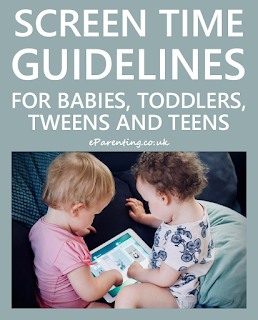Screen Time for Children
How Much Screen Time is Appropriate for Your Child?
If you’re the parent of a young child, you’ve probably wondered how much screen time your child should be getting each day. It can be easy to say that children should be kept away from screens altogether, but in today’s world it can be nearly impossible to not have your child around screens at some point during the day (or night). To make sure your child gets the right amount of screen time, keep an eye on the recommendations provided by these charts on screen time by age.
When to start with media
Parents often ask, How much screen time should my child be having?
There's no easy answer. The American Academy of Pediatrics (AAP) advises that children under 18 months old not watch any screens at all, while 18-24 month old are advised to have no more than an hour total of screen time each day. Kids 2-5 years old should also have a maximum of one hour daily. Once kids reach age 6, the AAP recommends families set their own guidelines and usage limits depending on what feels appropriate for their family.
Amount of screen time
Screen time may be beneficial for children if it's used wisely. Common benefits of screen time include improved reading and writing skills, creative thinking skills, problem-solving abilities, and improved math skills. However, too much screen time can lead to problems such as obesity, sleep disturbances, depression, social difficulties and attention problems. Below are general guidelines to help you know how much screen time to allow your child:
8 years old or younger - Under 2 hours a day; Over 8 years old - Unlimited
Quality over quantity
Screen time has many benefits such as reading, learning languages, and more. But it can also be problematic if used excessively. Children are very susceptible to screen time effects that may even lead to addiction. That’s why the American Academy of Pediatrics (AAP) advises parents to keep kids’ screen time under an hour per day for children aged 2-5 years old and have them avoid screens altogether at bedtime. For teens, they recommend less than two hours of screen time total a day and no more than one hour before bedtime.
Develop media balance
For some families, limits on screen time create healthy boundaries, but for others, the limits are impractical. Setting a balance of screen times can help children find their healthy way to engage with screens. As a general rule, parents should know that studies show young children may learn better when they're not exposed to screens at all. It's up to each family to find what works best for them and their kids by keeping in mind the following:
1) set rules that work with your life and your child's needs
2) focus on unplugging before bedtime
3) make sure everyone shares responsibility
4) respect individual differences in learning styles.
The goal is balance so all members of the family can have a happy digital life together.
Keep devices in common areas
Dividing screen time between multiple devices means that kids will also be getting the opportunity to play with other children in a communal space. This can be really good for their social and emotional development, because they are learning how to interact with others. As you might expect, many children gravitate toward the newest tech or gadgets on the market, so rotating them out on a regular basis is important too. If your child has been spending all day sitting in front of one device it's a good idea to get up and walk around every hour or so. Remember, sitting around too long isn't healthy!
1-2 hours per day is fine for most kids under 10 years old
With so many apps and websites available, it can be hard to know what your child should or shouldn't be doing on the computer.
• Ages 5-7: The American Academy of Pediatrics recommends less than an hour of total screen time per day, with no more than a few minutes at a time. Try to have one computer in a central area of the house where everyone can use it, but don't allow children to spend any more time than necessary in front of the screen
•Ages 8-12: Aim for two hours total screen time per day. Remember that sleep needs are most important during this period and allow kids to take breaks from TV and computers often.
2-3 hours per day is fine for most tweens and teens
Studies show that too much screen time can have negative impacts on your child's behavior and health. However, if screen time doesn't interfere with their development or disrupt their lives, it may not be a problem at all. Children should follow the lead of their parents in terms of using technology responsibly. In addition, tweens and teens need to be careful when they're scrolling through social media apps because there can be so many triggers from pictures and videos posted by peers.


0 Comments
Google
What's app
Facebook
Instagram
Pinterest
Medium.com
TikTok